It is Mr. Ciardis great merit to be one of the first American translators to have ... reproduced [ The Inferno ] successfully in English. A text with the clarity and sobriety of a first-rate prose translation which at the same time suggests in powerful and unmistakable ways the run and rhythm of the great original ... a spectacular achievement.
Archibald MacLeish
Fresh and sharp.... I think this version of Dante will be in many respects the best we have seen.
John Crowe Ransom
DANTE ALIGHIERI was born in 1265. Considered Italys greatest poet, this scion of a Florentine family mastered the art of lyric poetry at an early age. His first major work, La Vita Nuova (1292), was a tribute to Beatrice Portinari, the great love of his life. Dantes political activism resulted in his being exiled from Florence, and he eventually settled in Ravenna. It is believed that The Divine Comedy comprising three canticles, The Inferno, The Purgatorio, and The Paradiso-was written between 1308 and 1320. Dante Alighieri died in 1321.
JOHN CIARDI was a distinguished poet and professor, having taught at Harvard and Rutgers universities, and a poetry editor of The Saturday Review. He was a Fellow of the American Academy of Arts and Sciences and the National Institute of Arts and Letters. In 1955, he won the Harriet Monroe Memorial Award, and in 1956, the Prix de Rome. He died in 1986.

SIGNET CLASSICS
Published by New American Library, a division of
Penguin Group (USA) Inc., 375 Hudson Street,
New York, New York 10014, USA
Penguin Group (Canada), 90 Eglinton Avenue East, Suite 700, Toronto,
Ontario M4P 2Y3, Canada (a division of Pearson Penguin Canada Inc.)
Penguin Books Ltd., 80 Strand, London WC2R ORL, England
Penguin Ireland, 25 St. Stephens Green, Dublin 2,
Ireland (a division of Penguin Books Ltd.)
Penguin Group (Australia), 250 Camberwell Road, Camberwell, Victoria 3124,
Australia (a division of Pearson Australia Group Pty. Ltd.)
Penguin Books India Pvt. Ltd., 11 Community Centre, Panchsheel Park,
New Delhi - 110 017, India
Penguin Group (NZ), 67 Apollo Drive, Rosedale, North Shore 0632,
New Zealand (a division of Pearson New Zealand Ltd.)
Penguin Books (South Africa) (Pty.) Ltd., 24 Sturdee Avenue,
Rosebank, Johannesburg 2196, South Africa
Penguin Books Ltd., Registered Offices:
80 Strand, London WC2R ORL, England
Published by Signet Classics, an imprint of New American Library, a division of
Penguin Group (USA) Inc. Previously published in a Mentor edition.
First Signet Classics Printing, June
Copyright John Ciardi, 1954, 1982
All rights reserved
eISBN : 978-1-101-07803-7
 REGISTERED TRADEMARKMARCA REGISTRADA
REGISTERED TRADEMARKMARCA REGISTRADA
Without limiting the rights under copyright reserved above, no part of this publication may be reproduced, stored in or introduced into a retrieval system, or transmitted, in any form, or by any means (electronic, mechanical, photocopying, recording, or otherwise), without the prior written permission of both the copyright owner and the above publisher of this book.
The scanning, uploading and distribution of this book via the Internet or via any other means without the permission of the publisher is illegal and punishable by law. Please purchase only authorized electronic editions, and do not participate in or encourage electronic piracy of copyrighted materials. Your support of the authors rights is appreciated.
http://us.penguingroup.com
To Judith
Cosi nandammo infino alla lumiera,
parlando cose, che il tacere bello,
si com era il parlar col dov era.
Translators Note
When the violin repeats what the piano has just played, it cannot make the same sounds and it can only approximate the same chords. It can, however, make recognizably the same music, the same air. But it can do so only when it is as faithful to the self-logic of the violin as it is to the self-logic of the piano.
Language too is an instrument, and each language has its own logic. I believe that the process of rendering from language to language is better conceived as a transposition than as a translation, for translation implies a series of word-for-word equivalents that do not exist across language boundaries any more than piano sounds exist in the violin.
The notion of word-for-word equivalents also strikes me as false to the nature of poetry. Poetry is not made of words but of word-complexes, elaborate structures involving, among other things, denotations, connotations, rhythms, puns, juxtapositions, and echoes of the tradition in which the poet is writing. It is difficult in prose and impossible in poetry to juggle such a complex intact across the barrier of language. What must be saved, even at the expense of making four strings do for eighty-eight keys, is the total feeling of the complex, its gestalt.
The only way I could see of trying to preserve that gestalt was to try for a language as close as possible to Dantes, which is in essence a sparse, direct, and idiomatic language, distinguishable from prose only in that it transcends every known notion of prose. I do not imply that Dantes is the language of common speech. It is a much better thing than that: it is what common speech would be if it were made perfect.
One of the main sources of the tone of Dantes speech is his revolt from the Sicilian School of Elegance. Nothing would be more misleading than to say that Dantes language is simple. Overwhelmingly, however, it seeks to avoid elegance simply for the sake of elegance. And overwhelmingly it is a spoken tongue.
I have labored therefore for something like idiomatic English in the present rendering. And I have foregone the use of Dantes triple rhyme because it seemed clear that one rendering into English might save the rhyme or save the tone of the language, but not both. It requires approximately 1500 triple rhymes to render The Inferno and even granted that many of these combinations can be used and re-used, English has no such resources of rhyme. Inevitably the language must be inverted, distorted, padded, and made unspeakable in order to force the line to come out on that third all-consuming rhyme. In Italian, where it is only a slight exaggeration to say that everything rhymes with everything else or a variant form of it, the rhyme is no problem: in English it is disaster.
At the same time some rhyme is necessary, I think, to approximate Dantes way of going, and the three line stanzas seem absolutely indispensable because the fact that Dantes thought tends to conclude at the end of each tercet (granted a very large number of run-on tercets) clearly determines the pace of the writing, i.e., the rate at which it reveals itself to the reader. These were my reasons for deciding on the present form. Moreover, I have not hesitated to use a deficient rhyme when the choice seemed to lie between forcing an exact rhyme and keeping the language more natural.
For my interpretation of many difficult passages I have leaned heavily on the Biagi commentaries, and even more heavily on the Vandelli-Scartazzini. A number of these interpretations are at odds with those set forth in some of the more familiar English versions of The Inferno, but, subject to my own error, this rendering is consistent at all points with Vandellis range of arguments.
I have also leaned heavily on the good will and knowledge of a number of scholars. Dudley Fitts read patiently through the whole manuscript and made detailed, and usually legible, notes on it. Professor A. T. MacAllister not only gave me the benefit of another complete set of detailed notes, but agreed to undertake the historical introduction so important to a good understanding of Dante, and so brilliantly presented here.

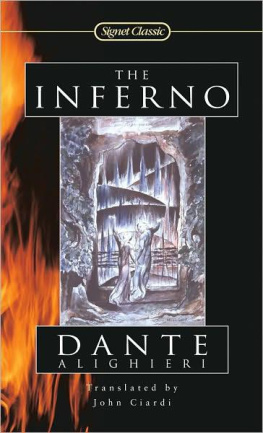
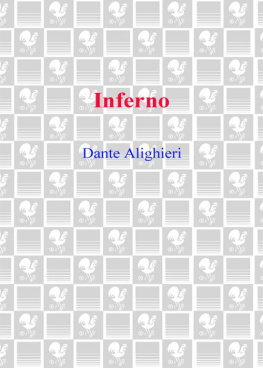
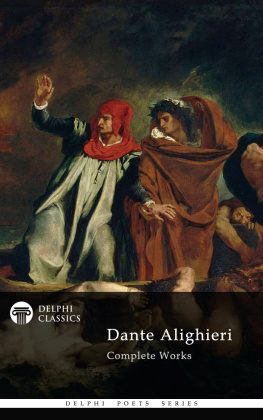
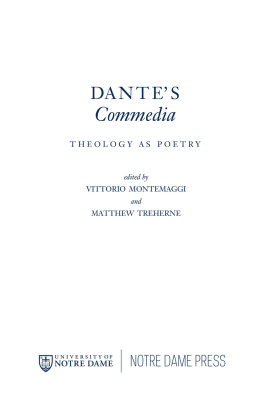
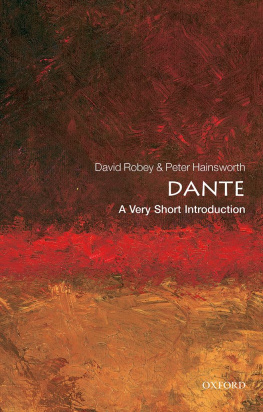
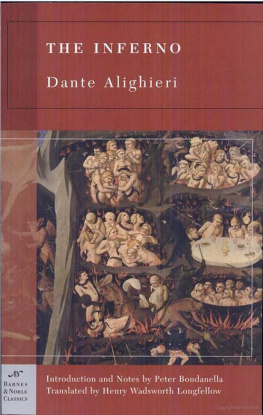
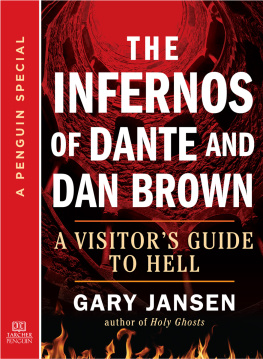
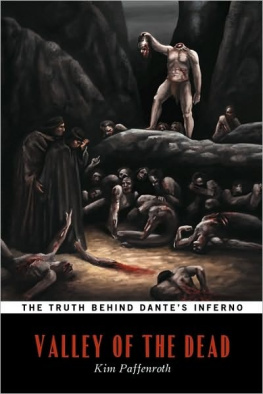

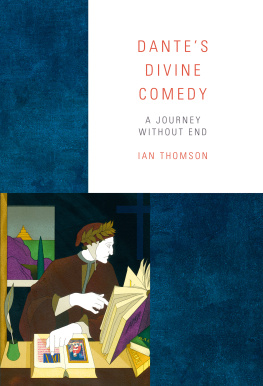
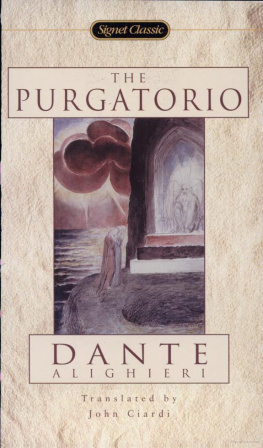
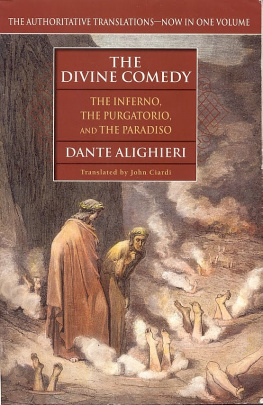
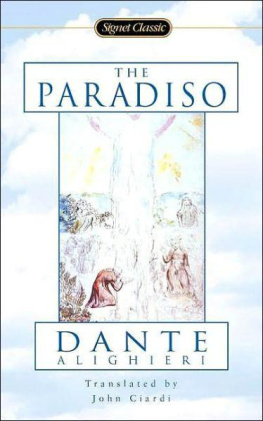

 REGISTERED TRADEMARKMARCA REGISTRADA
REGISTERED TRADEMARKMARCA REGISTRADA